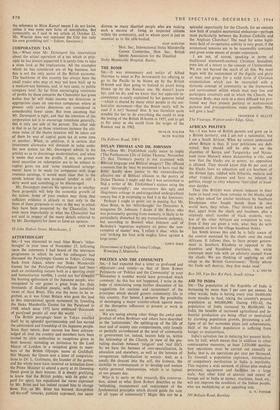POLITICS AND THE COMMUNITY
SIR,-1 had expected that a letter as profound and important—and timely—as that of Dom Robert Petitpierre on' 'Politics and the Community' in your
"November 6 number would have provoked much comment. As this has not happened, I write in the hope of stimulating some further discussion of his suggestions for analysis and restatement of the principles which should govern community life in this country. For herein I perceive the possibility of developing a major counter-attack against many of the disruptive influences at present at work in our society.
We are seeing among other things the awful end- product of what Berdyaev and others have described as the 'autonomies,' the splitting-up of the life of man and of society into compartments, only loosely or partially co=ordinated at the level of community or government (or, indeed, heaven help us, within the fellowship of the Church, in view of the pre- vailing dualism between 'religion' and 'real life'). So we have the heresies of over-specialisation, in education and elsewhere, as well as the heresies of unregenerate individualism in society. And, as a result; the descent into the self, the lostness, the inability to communicate or to develop• and sustain viable personal relationships, which is so typical of our present day.
Who is to carry on this research, this conversa- tion, aimed at what Dom Robert describes as the 'rethinking, reassessment and restatement of the fundamental principles which should guide the care of all types of community'? Might this not be a
splendid opportunity for the Church, for an entirely new field of creative ecumenical endeavour—perhaps most particularly between the Roman Catholic and the Anglican Churches? The need for some legiti- mate field of co-operative activity is very great, if the ecumenical tensions arc to be reasonably contained and given some means of proper expression.
I am not, of course, speaking in terms of traditional nineteenth-century Christian Socialism; even less of a return to the concept of Christendom. We are out beyond the reach of all this. We must begin with the restatement of the dignity and glory of man, and grope for a valid form of Christian existentialism which can be reconciled with a dynamic concept of community as the framework and environment within which man may live and participate creatively and in which the Church, the mystical Body, may exist in a more diffused but pro- found way than present pastoral or ecclesiastical patterns and presuppositions make possible. Who will give a lead?




























 Previous page
Previous page